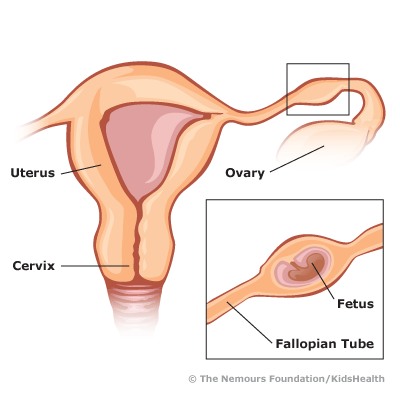Ectopic Pregnancy
What Is an Ectopic Pregnancy?
In a normal pregnancy, the fertilized egg implants and develops in the uterus. In an ectopic pregnancy, the egg implants somewhere other than the uterus — often, in the fallopian tubes. This is why ectopic pregnancies are commonly called “tubal pregnancies.” The egg also can implant in the ovary, abdomen, or the cervix.
None of these areas has the right space or nurturing tissue for a pregnancy to develop. As the fetus grows, it will eventually burst the organ that contains it. This can cause severe bleeding and endanger the mother’s life. A classical ectopic pregnancy does not develop into a live birth.

What Are the Signs & Symptoms of an Ectopic Pregnancy?
Ectopic pregnancy can be hard to diagnose because symptoms often are like those of a normal early pregnancy. These can include missed periods, breast tenderness, nausea, vomiting, tiredness, or frequent urination (peeing).
Often, the first warning signs of an ectopic pregnancy are pain or vaginal bleeding. There might be pain in the pelvis, abdomen, or even the shoulder or neck (if blood from a ruptured ectopic pregnancy builds up and irritates certain nerves). The pain can range from mild and dull to severe and sharp. It might be felt on just one side of the pelvis or all over.
These symptoms also might happen with an ectopic pregnancy:
- vaginal spotting
- dizziness or fainting (caused by blood loss)
- low blood pressure (also caused by blood loss)
- lower back pain
What Causes an Ectopic Pregnancy?
An ectopic pregnancy usually happens because a fertilized egg couldn’t quickly move down the fallopian tube into the uterus. The tube can get blocked from an infection or inflammation. The tube can get blocked from:
- pelvic inflammatory disease (PID)
- endometriosis, when cells from the lining of the uterus implant and grow elsewhere in the body
- scar tissue from previous abdominal or fallopian surgeries
- rarely, birth defects that changed the shape of the tube
How Is an Ectopic Pregnancy Diagnosed?
If a woman might have an ectopic pregnancy, her doctor may do an ultrasound to see where the developing fetus is. Often, pregnancies are too small to see on ultrasound until more than 5 or 6 weeks after a woman’s last menstrual period. If an external ultrasound can’t show the pregnancy, the doctor might do the test with a wand-like device in the vagina.
A woman might need testing every few days if the first tests can’t confirm or rule out an ectopic pregnancy.
How Is an Ectopic Pregnancy Treated?
How doctors treat an ectopic pregnancy depends on things like the size and location of the pregnancy.
Sometimes they can treat an early ectopic pregnancy with an injection of methotrexate, which stops the growth of the embryo. The tissue usually is then absorbed by the woman’s body.
If the pregnancy is farther along, doctors usually need to do surgery to remove the abnormal pregnancy.
Whatever treatment she gets, a woman will see her doctor regularly afterward to make sure her pregnancy hormone levels return to zero. This may take several weeks. An elevated level could mean that some ectopic tissue was missed. If so, she might need more methotrexate or surgery.
What About Future Pregnancies?
Most women who have had an ectopic pregnancy can have normal pregnancies in the future. Having had one ectopic pregnancy does increase a woman’s risk of having another one.
What Else Should I Know?
Any woman can have an ectopic pregnancy. But the risk is higher for women who are older than 35 and those who have had:
- PID
- a previous ectopic pregnancy
- surgery on a fallopian tube
- infertility problems or medicine to stimulate ovulation
Some birth control methods also can affect a woman’s risk of ectopic pregnancy. Those who become pregnant while using an intrauterine device (IUD) might be more likely to have an ectopic pregnancy. Smoking and having multiple sexual partners also increase the risk of an ectopic pregnancy.
When Should I Call the Doctor?
If you believe you’re at risk for an ectopic pregnancy, meet with your doctor to talk about your options before you become pregnant. If you are pregnant and have any concerns about the pregnancy being ectopic, talk to your doctor — it’s important to find it early. Your doctor might want to check your hormone levels or schedule an early ultrasound to ensure that your pregnancy is developing normally.
Call your doctor right away if you’re pregnant and having any pain, bleeding, or other symptoms of ectopic pregnancy.
